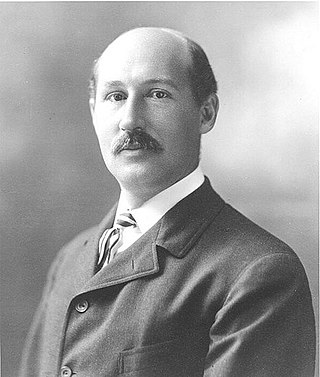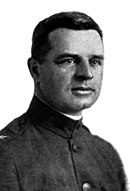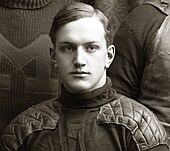
The 1910 College Football All-America team is composed of college football players who were selected as All-Americans for the 1910 college football season. The only selector for the 1910 season who has been recognized as "official" by the National Collegiate Athletic Association (NCAA) is Walter Camp. Many other sports writers, newspapers, coaches and others also selected All-America teams in 1910. The magazine Leslie's Weekly attempted to develop a consensus All-American by polling 16 football experts and aggregating their votes. Others who selected All-Americans in 1911 include The New York Times, The New York Sun, and sports writer Wilton S. Farnsworth of the New York Evening Journal.

The 1912 College Football All-America team is composed of college football players who were selected as All-Americans for the 1912 college football season. The only selector for the 1912 season who has been recognized as "official" by the National Collegiate Athletic Association (NCAA) is Walter Camp. Many other sports writers, newspapers, coaches and others also selected All-America teams in 1912. One writer, Louis A. Dougher, published a "Composite Eleven" in the Washington Times which consisted of his aggregating the first-team picks of 23 selectors.

The 1913 College Football All-America team is composed of college football players who were selected as All-Americans for the 1913 college football season. The only two selectors who have been recognized as "official" selectors by the National Collegiate Athletic Association (NCAA) for the 1913 season are Walter Camp and the International News Service (INS). Camp's All-America Team was published in Collier's Weekly. The INS was founded in 1909 by William Randolph Hearst, and its sports editor Frank G. Menke selected the INS All-America team. Other sports writers, newspapers, coaches selecting All-America teams in 1913 included Harper's Weekly, Fielding H. Yost, and Parke H. Davis.
The 1914 College Football All-America team is composed of college football players who were selected as All-Americans for the 1914 college football season. The only selectors for the 1914 season who have been recognized as "official" by the National Collegiate Athletic Association (NCAA) are Walter Camp, whose selections were published in Collier's Weekly, and the International News Service (INS), a newswire founded by William Randolph Hearst.
The 1922 College Football All-America team is composed of college football players who were selected as All-Americans by various organizations and writers that chose College Football All-America Teams in 1922. The only selector recognized by the NCAA as "official" for the 1922 season is Walter Camp, whose selections were published in Collier's Weekly. Additional selectors who chose All-American teams in 1922 included: Athletic World magazine, selected by 214 coaches; Norman E. Brown, sports editor of the Central Press Association; the New York Tribune, selected by Ray McCarthy with advice from Grantland Rice and William B. Hanna; Walter Eckersall, of the Chicago Tribune; Frank G. Menke; and Billy Evans, who polled 200 sports editors.
The 1907 College Football All-America team is composed of various organizations that chose basketball teams that season. The organizations that chose the teams included Collier's Weekly selected by Walter Camp.

The 1898 College Football All-America team is composed of American football players who were selected as the best players at their positions by various organizations that chose College Football All-America Teams that season. The organizations that chose the teams included Collier's Weekly selected by Walter Camp and the Syracuse Herald.
The 1903 College Football All-America team is composed of various organizations that chose College Football All-America Teams that season. The organizations and individuals that chose the teams included Collier's Weekly selected by Walter Camp, Caspar Whitney for Outing magazine, Charles Chadwick and Fielding H. Yost.
The 1904 College Football All-America team is composed of various organizations that chose College Football All-America Teams that season. The organizations that chose the teams included Collier's Weekly selected by Walter Camp.

The 1906 College Football All-America team is composed of college football players who were selected as All-Americans by various organizations and writers that chose College Football All-America Teams for the 1906 college football season. The organizations that chose the teams included Walter Camp for Collier's Weekly, Caspar Whitney for Outing Magazine, the New York World, the New York Sun, The New York Times, the New York Mail, and Charles Chadwick.
The 1905 College Football All-America team is composed of college football players who were selected as All-Americans by various organizations and writers that chose College Football All-America Teams for the 1905 college football season. The organizations that chose the teams included Walter Camp for Collier's Weekly and Caspar Whitney for Outing Magazine.

The 1908 College Football All-America team is composed of college football players who were selected as All-Americans for the 1908 college football season. The only two individuals who have been recognized as "official" selectors by the National Collegiate Athletic Association (NCAA) for the 1908 season are Walter Camp and Caspar Whitney, who had originated the College Football All-America Team 14 years earlier in 1889. Camp's 1908 All-America Team was published in Collier's Weekly, and Whitney's selections were published in Outing magazine.

The 1902 College Football All-America team is composed of college football players who were selected as All-Americans by various individuals who chose College Football All-America Teams for the 1902 college football season. The only two individuals who have been recognized as "official" selectors by the National Collegiate Athletic Association (NCAA) for the 1902 season are Walter Camp and Caspar Whitney, who had originated the College Football All-America Team 14 years earlier in 1889. Camp's 1902 All-America Team was published in Collier's Weekly, and Whitney's selections were published in Outing magazine.

The 1900 College Football All-America team is composed of college football players who were selected as All-Americans by various individuals who chose College Football All-America Teams for the 1900 college football season. The only two individuals who have been recognized as "official" selectors by the National Collegiate Athletic Association (NCAA) for the 1900 season are Walter Camp and Caspar Whitney, who had originated the College Football All-America Team eleven years earlier in 1889. Camp's 1900 All-America Team was published in Collier's Weekly, and Whitney's selections were published in Outing magazine.
The 1899 College Football All-America team is composed of college football players who were selected as All-Americans by various organizations and writers that chose College Football All-America Teams for the 1899 college football season. The organizations that chose the teams included Walter Camp for Collier's Weekly and Caspar Whitney for Outing Magazine.
The 1896 College Football All-America team is composed of college football players who were selected as All-Americans for the 1896 college football season, as selected by Caspar Whitney for Harper's Weekly and the Walter Camp Football Foundation.
The 1895 College Football All-America team is composed of college football players who were selected as All-Americans for the 1895 college football season, as selected by Caspar Whitney for Harper's Weekly and the Walter Camp Football Foundation. Whitney began publishing his All-America Team in 1889, and his list, which was considered the official All-America Team, was published in Harper's Weekly from 1891 to 1896.
The 1894 College Football All-America team is composed of college football players who were selected as All-Americans for the 1894 college football season, as selected by Caspar Whitney for Harper's Weekly and the Walter Camp Football Foundation. Whitney began publishing his All-America Team in 1889, and his list, which was considered the official All-America Team, was published in Harper's Weekly from 1891 to 1896.

The 1893 College Football All-America team is composed of college football players who were selected as All-Americans for the 1893 college football season, as selected by Caspar Whitney for Harper's Weekly and the Walter Camp Football Foundation. Whitney began publishing his All-America Team in 1889, and his list, which was considered the official All-America Team, was published in Harper's Weekly from 1891 to 1896. Harvard Law School student and football center William H. Lewis became the first African-American to be selected as an All-American in 1892, an honor he received again in 1893.

The 1892 College Football All-America team was composed of college football players who were selected as the best players at their respective positions for the 1892 college football season, as selected by Caspar Whitney for Harper's Weekly and the Walter Camp Football Foundation. Whitney began publishing his All-America Team in 1889, and his list, which was considered the official All-America Team, was published in Harper's Weekly from 1891 to 1896. Harvard Law School student and football center William H. Lewis became the first African-American to be selected as an All-American in 1892, an honor he would receive again in 1893.













